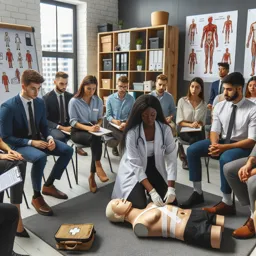Introduction
First aid is more than just a skill—it’s a critical component of every school’s safety strategy. Empowering staff and students with the knowledge and resources to handle emergencies can make a life-saving difference. One effective way to strengthen preparedness is by forming a dedicated School First Aid Team.
Why Form a School First Aid Team?
Emergencies such as sudden illnesses, allergic reactions, or accidents demand immediate, coordinated action. A School First Aid Team ensures that trained individuals are ready to:
- Respond quickly to medical emergencies
- Provide proper first aid care
- Reduce the severity of injuries
- Support a safer school environment
Key Roles in a School First Aid Team
A well-structured team has defined responsibilities:
- Team Leader: Manages organization, training schedules, and first aid supplies.
- First Responders: Staff (and in some cases, students) trained to administer first aid and assess emergencies.
- Communication Specialist: Handles emergency calls and updates parents or guardians.
- Record Keeper: Maintains incident logs, training records, and ensures first aid kits are fully stocked.
Essential Training for Team Members
Every team member should receive training in:
- Basic life support (CPR & AED use)
- Wound, burn, and fracture care
- Asthma and allergy management
- Choking response techniques
- Shock and fainting management
- Proper use and maintenance of first aid supplies
Regular refresher courses and scenario-based drills keep skills sharp and improve confidence during real emergencies.
Best Practices for Effective School First Aid Teams
To maintain efficiency and readiness, schools should:
- Review and update first aid policies annually
- Keep first aid kits stocked and accessible
- Conduct regular emergency drills
- Clearly display first aid locations and team member information
- Promote a culture of safety where incidents and hazards are promptly reported
Engaging Students in First Aid Preparedness
Students can also play a vital role in school safety. Offering age-appropriate first aid lessons and involving them in awareness campaigns builds a more prepared and supportive community.
Conclusion: Creating a Safer School Environment
Forming a School First Aid Team is an investment in the health and security of your school. By defining roles, providing proper training, and implementing best practices, schools can respond more effectively to emergencies and create a safer environment for everyone.



























